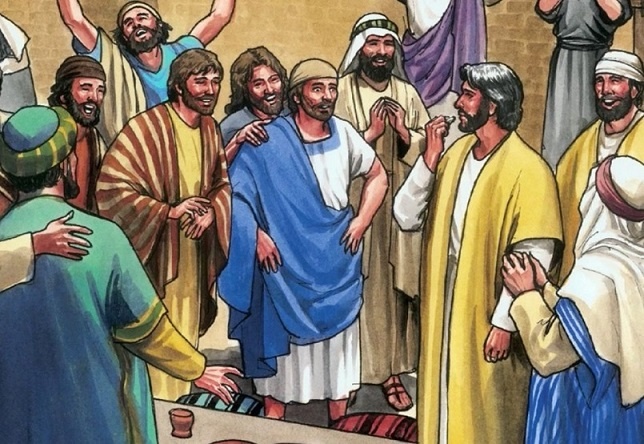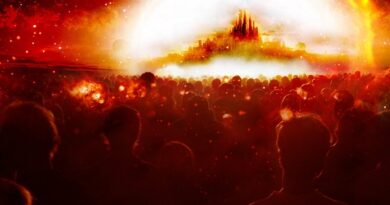“A Spirit Hath Not Flesh and Bones…”
Did the Disciples of Jesus Believe in Ghosts?
Did Jesus’ disciples believe in “ghosts”? By this we mean: did they believe that the departed immortal spirits of the dead could walk among us? Some authors, attempting to maintain the doctrine of the soul’s immortality seem to believe just that. Consider the following quote from Robert Morey:
It is obvious that the Jews during the first century as well as during the Old Testament age believed in the survival of man’s mind or soul after the death of the body because they clearly believed in ‘ghosts’ (Luke 24:37). p.62 Death and the Afterlife
Statements such as this appear to be valid when taken at face value, but when we take a close look at the scriptural evidence, a much different picture emerges. Let’s first consider the passage from Luke cited above:
And as they thus spake, Jesus himself stood in the midst of them, and saith unto them, Peace be unto you. But they were terrified and affrighted, and supposed that they had seen a spirit (Gk. Pneuma). And he said unto them, Why are ye troubled? and why do thoughts arise in your hearts? Behold my hands and my feet, that it is I myself: handle me, and see; for a spirit hath not flesh and bones, as ye see me have. And when he had thus spoken, he shewed them his hands and his feet. Luke 24:36-40
First of all, we must notice that this passage simply does not say what some such as Morey would like it to; namely that the disciples believed they were beholding the departed spirit of a dead man. We have seen time and again how words such as “soul” and “spirit” conjure up mental images which may or may not be true to scriptural teaching. It should be apparent that Robert Morey is assuming that the disciples believed they were beholding the departed conscious spirit of a dead man, simply because of how he views the word “spirit” in this text. But of course, such reasoning proves absolutely nothing.
However, I think we need to ask: If the disciples believed that they were beholding the “ghost” of Jesus, why then were they so terrified? Furthermore, the very same people who attempt to use this passage to teach the immortality of the soul also teach that the parable of the Rich Man and Lazarus was Jesus’ most complete description on the state of the dead. This creates a serious difficulty. If the disciples had understood the parable of The Rich Man and Lazarus to be a literal and emphatic teaching on the state of departed spirits, then surely they must have also understood that the appearing of such a spirit in the midst of them was impossible!
There is no difficulty in this passage once we stop reading in assumptions and ideas which simply are not in the text. As we have seen many times, men are NEVER called ‘spirits’ in the Bible. On the contrary, the line is always drawn between the fleshly nature and the spirit nature. Men are converted to a spirit nature only in the resurrection, when the union of the flesh and the spirit is consummated. But even then they are MEN of a spirit nature, not spirits. “It is sown a natural body, it is raised a spiritual body. 1 Cor 15:44” But there is still a body although changed.
In light of this, the text before us makes complete sense:
Behold my hands and my feet, that it is I myself: handle me, and see; for a spirit hath not flesh and bones, as ye see me have.
The disciples certainly did not believe they were beholding the departed “ghost” of a dead man. Some may have a difficult time grasping this because it is difficult for them to understand that men are never referred to as “spirits” in scripture when we have been taught this error for so long. Man has a spirit, meaning his mind, will, seat of emotion etc; the area of his thinking which is able to discern right and wrong and communicate with God, but this is a far cry from teaching that man has a “ghost” which dwells inside his flesh.
Every time “spirit” is used of a conscious being, it is always a reference to either God (“God is a spirit”, John 4:24), angels (“are they not all ministering spirits”, Heb 1:14), Demons (“and when the unclean spirit had torn him”, Mark 1:26), or the nature of man AFTER the resurrection. There is simply no scriptural allowance made for for a ‘pneuma’ existing as a conscious ‘ghost’ between death and the resurrection.
Furthermore, if we compare this passage from Luke with another passage, we can see clearly that the disciples did not believe they were beholding the departed spirit of a dead man.
And in the fourth watch of the night Jesus went unto them, walking on the sea. And when the disciples saw him walking on the sea, they were troubled, saying, It is a spirit (Gk. Fantasma); and they cried out for fear. But straightway Jesus spake unto them, saying, Be of good cheer; it is I; be not afraid. Matt 14:25-27
The language here is almost parallel to that of Luke. In both cases the disciples believed they were beholding something other than Jesus. However in this case, the Greek word that has been rendered “spirit” into English is fantasma, from which we get our English word “phantom”.
If it is difficult for the reader to grasp that men are never called “spirits” in the Bible, then certainly we should at least be able to see that men are never referred to as “phantoms” whether dead or alive. The Bible never speaks of a dead man turning into a “fantasma”. Therefore, in both cases, the disciples obviously felt they were seeing an apparition of a spirit being, not the departed ghost of a dead man.
Scripturally then, we have only three choices: They thought they were beholding God, they thought they were seeing an angel, or they felt they were seeing a demonic manifestation.
Logically, the third option is the only one that makes sense and harmonizes ALL the scriptural evidence. When Jesus died, the disciples knew he was really dead; that he could not appear to them. Therefore, it makes perfect sense that they would be terrified when something they felt was a “spirit” appeared in their midst. They knew it couldn’t be Jesus, so they felt they were beholding a demonic manifestation.
We also have external evidence to show that this is exactly what they believed. Ignatius who died around 100 AD writes to those in Smyrna:
For I know and believe that he was in the flesh even after the resurrection; and when he came to Peter and those with him, he said to them: “Take hold of me; handle me and see that I am not a disembodied demon”
This proves that there was a very early understanding that this was the true interpretation of the text. Therefore, all lines of evidence, internal, external, as well as logical point to the simple fact that the scriptures in no way teach that the disciples of Jesus believed in ghosts; at least not in the sense of them being the conscious departed spirits of men.
– Man Became a Living Soul – Appendix C



